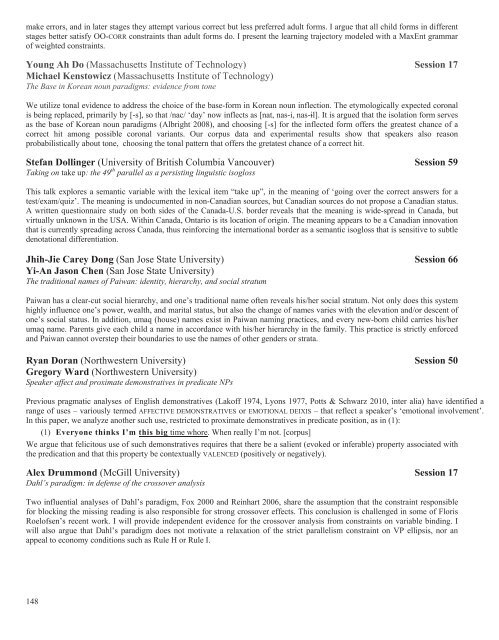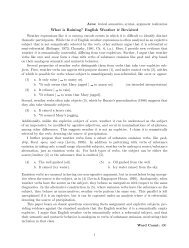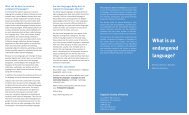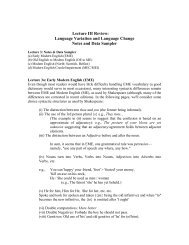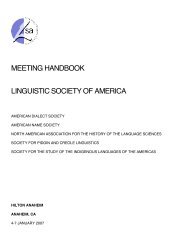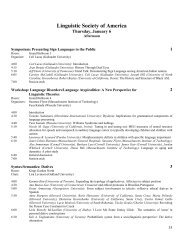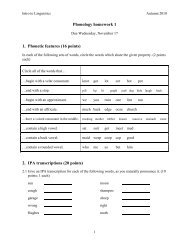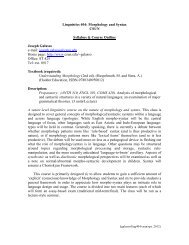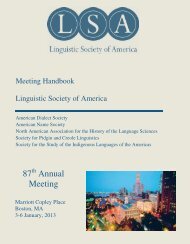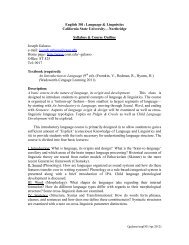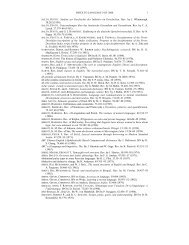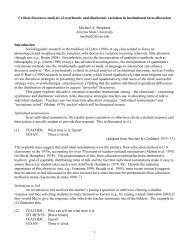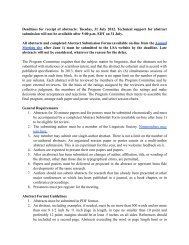here - Linguistic Society of America
here - Linguistic Society of America
here - Linguistic Society of America
You also want an ePaper? Increase the reach of your titles
YUMPU automatically turns print PDFs into web optimized ePapers that Google loves.
make errors, and in later stages they attempt various correct but less preferred adult forms. I argue that all child forms in differentstages better satisfy OO-CORR constraints than adult forms do. I present the learning trajectory modeled with a MaxEnt grammar<strong>of</strong> weighted constraints.Young Ah Do (Massachusetts Institute <strong>of</strong> Technology) Session 17Michael Kenstowicz (Massachusetts Institute <strong>of</strong> Technology)The Base in Korean noun paradigms: evidence from toneWe utilize tonal evidence to address the choice <strong>of</strong> the base-form in Korean noun inflection. The etymologically expected coronalis being replaced, primarily by [-s], so that /nac/ ‘day’ now inflects as [nat, nas-i, nas-il]. It is argued that the isolation form servesas the base <strong>of</strong> Korean noun paradigms (Albright 2008), and choosing [-s] for the inflected form <strong>of</strong>fers the greatest chance <strong>of</strong> acorrect hit among possible coronal variants. Our corpus data and experimental results show that speakers also reasonprobabilistically about tone, choosing the tonal pattern that <strong>of</strong>fers the gretatest chance <strong>of</strong> a correct hit.Stefan Dollinger (University <strong>of</strong> British Columbia Vancouver) Session 59Taking on take up:the49 th parallel as a persisting linguistic isoglossThis talk explores a semantic variable with the lexical item “take up”, in the meaning <strong>of</strong> ‘going over the correct answers for atest/exam/quiz’. The meaning is undocumented in non-Canadian sources, but Canadian sources do not propose a Canadian status.A written questionnaire study on both sides <strong>of</strong> the Canada-U.S. border reveals that the meaning is wide-spread in Canada, butvirtually unknown in the USA. Within Canada, Ontario is its location <strong>of</strong> origin. The meaning appears to be a Canadian innovationthat is currently spreading across Canada, thus reinforcing the international border as a semantic isogloss that is sensitive to subtledenotational differentiation.Jhih-Jie Carey Dong (San Jose State University) Session 66Yi-An Jason Chen (San Jose State University)The traditional names <strong>of</strong> Paiwan: identity, hierarchy, and social stratumPaiwan has a clear-cut social hierarchy, and one’s traditional name <strong>of</strong>ten reveals his/her social stratum. Not only does this systemhighly influence one’s power, wealth, and marital status, but also the change <strong>of</strong> names varies with the elevation and/or descent <strong>of</strong>one’s social status. In addition, umaq (house) names exist in Paiwan naming practices, and every new-born child carries his/herumaq name. Parents give each child a name in accordance with his/her hierarchy in the family. This practice is strictly enforcedand Paiwan cannot overstep their boundaries to use the names <strong>of</strong> other genders or strata.Ryan Doran (Northwestern University) Session 50Gregory Ward (Northwestern University)Speaker affect and proximate demonstratives in predicate NPsPrevious pragmatic analyses <strong>of</strong> English demonstratives (Lak<strong>of</strong>f 1974, Lyons 1977, Potts & Schwarz 2010, inter alia) have identified arange <strong>of</strong> uses – variously termed AFFECTIVE DEMONSTRATIVES or EMOTIONAL DEIXIS – that reflect a speaker’s ‘emotional involvement’.In this paper, we analyze another such use, restricted to proximate demonstratives in predicate position, as in (1):(1) Everyone thinks I’m this big time whore. When really I’m not. [corpus]We argue that felicitous use <strong>of</strong> such demonstratives requires that t<strong>here</strong> be a salient (evoked or inferable) property associated withthe predication and that this property be contextually VALENCED (positively or negatively).Alex Drummond (McGill University) Session 17Dahl’s paradigm: in defense <strong>of</strong> the crossover analysisTwo influential analyses <strong>of</strong> Dahl’s paradigm, Fox 2000 and Reinhart 2006, share the assumption that the constraint responsiblefor blocking the missing reading is also responsible for strong crossover effects. This conclusion is challenged in some <strong>of</strong> FlorisRoel<strong>of</strong>sen’s recent work. I will provide independent evidence for the crossover analysis from constraints on variable binding. Iwill also argue that Dahl’s paradigm does not motivate a relaxation <strong>of</strong> the strict parallelism constraint on VP ellipsis, nor anappeal to economy conditions such as Rule H or Rule I.148


